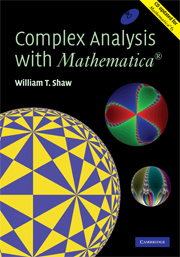Book contents
- Frontmatter
- Contents
- Preface
- 1 Why you need complex numbers
- 2 Complex algebra and geometry
- 3 Cubics, quartics and visualization of complex roots
- 4 Newton—Raphson iteration and complex fractals
- 5 A complex view of the real logistic map
- 6 The Mandelbrot set
- 7 Symmetric chaos in the complex plane
- 8 Complex functions
- 9 Sequences, series and power series
- 10 Complex differentiation
- 11 Paths and complex integration
- 12 Cauchy's theorem
- 13 Cauchy's integral formula and its remarkable consequences
- 14 Laurent series, zeroes, singularities and residues
- 15 Residue calculus: integration, summation and the argument principle
- 16 Conformal mapping I: simple mappings and Möbius transforms
- 17 Fourier transforms
- 18 Laplace transforms
- 19 Elementary applications to two-dimensional physics
- 20 Numerical transform techniques
- 21 Conformal mapping II: the Schwarz—Christoffel mapping
- 22 Tiling the Euclidean and hyperbolic planes
- 23 Physics in three and four dimensions I
- 24 Physics in three and four dimensions II
- Bibliograpy
- Index
8 - Complex functions
Published online by Cambridge University Press: 05 August 2014
- Frontmatter
- Contents
- Preface
- 1 Why you need complex numbers
- 2 Complex algebra and geometry
- 3 Cubics, quartics and visualization of complex roots
- 4 Newton—Raphson iteration and complex fractals
- 5 A complex view of the real logistic map
- 6 The Mandelbrot set
- 7 Symmetric chaos in the complex plane
- 8 Complex functions
- 9 Sequences, series and power series
- 10 Complex differentiation
- 11 Paths and complex integration
- 12 Cauchy's theorem
- 13 Cauchy's integral formula and its remarkable consequences
- 14 Laurent series, zeroes, singularities and residues
- 15 Residue calculus: integration, summation and the argument principle
- 16 Conformal mapping I: simple mappings and Möbius transforms
- 17 Fourier transforms
- 18 Laplace transforms
- 19 Elementary applications to two-dimensional physics
- 20 Numerical transform techniques
- 21 Conformal mapping II: the Schwarz—Christoffel mapping
- 22 Tiling the Euclidean and hyperbolic planes
- 23 Physics in three and four dimensions I
- 24 Physics in three and four dimensions II
- Bibliograpy
- Index
Summary
Introduction
In this section we give a more precise characterization of complex functions and review their basic properties. We also introduce some formal concepts, such as neighbourhoods and open sets, in order to lay the foundations for a discussion of continuity and differentiability. We shall then make a first definition of basic functions such as the exponential and trigonometric functions, and their inverses, by referring back to real definitions. This will be revisited in Chapter 9 from a power series perspective. We shall also look at the concept of branch points, and the extended complex plane or ‘Riemann sphere’.
We shall also explore various ways of visualizing complex functions using Mathematica. We can build various routines for looking at functions. The first one we will consider takes a two-dimensional point of view, where functions are regarded as mappings taking one region of the complex plane to another. The second regards the function as a pair of functions of two real variables, and we show how to use Mathematica's three-dimensional plotting routines to view simultaneously both the modulus and argument of complex functions. Then we shall develop some plot routines tailored to bring out the folded structure of certain complex functions. Note that, in this chapter, the output of all Mathematica computations is set to appear in TraditionalForm. If you are using Mathematica technology beyond version 5.2, you should explore the options provided in your current version for managing graphics. See also the on-line supplement and enclosed CD.
- Type
- Chapter
- Information
- Complex Analysis with MATHEMATICA® , pp. 159 - 193Publisher: Cambridge University PressPrint publication year: 2006



